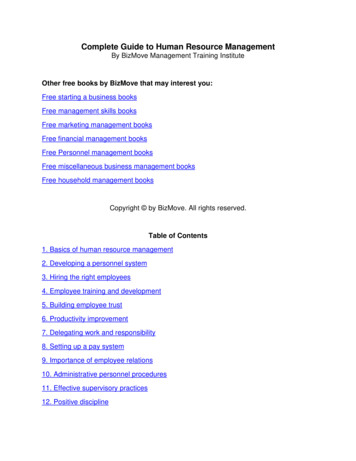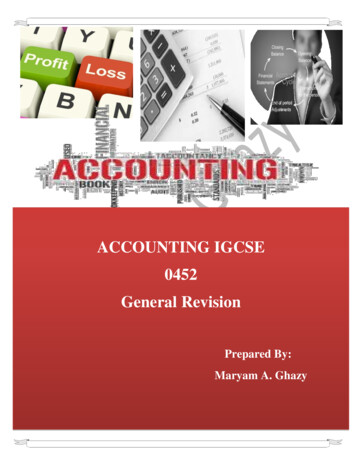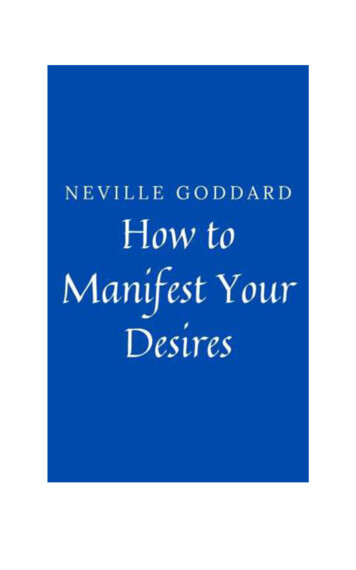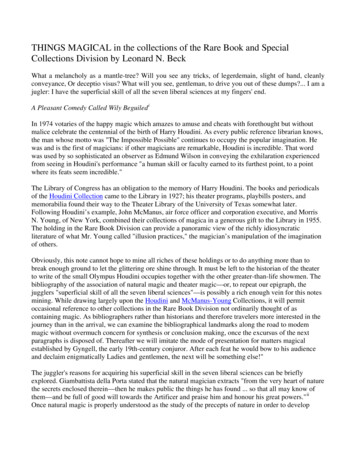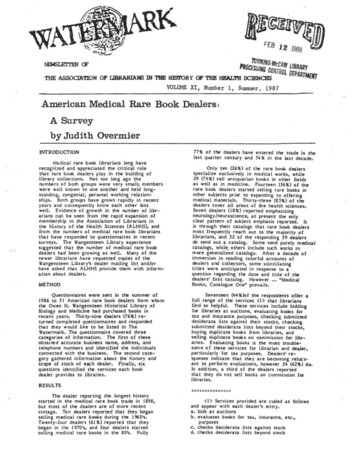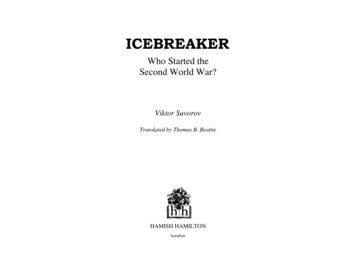
Transcription
ICEBREAKERWho Started theSecond World War?Viktor SuvorovTranslated by Thomas B. BeattieHAMISH HAMILTONLondon
For my brotherHamish Hamilton LtdPublished by the Penguin Group27 Wrights Lane, London W8 5TZ, EnglandViking Penguin Inc., 40 West 23rd Street, New York, New York 10010, USAPenguin Books Australia Ltd, Ringwood, Victoria, AustraliaPenguin Books Canada Ltd, 2801 John Street, Markham, Ontario, Canada L3R 1B4Penguin Books (NZ) Ltd, 182-190 Wairau Road, Auckland 10, New ZealandPenguin Books Ltd, Registered Offices: Harmondsworth, Middlesex, EnglandFirst published in France by Editions Olivier Orban 1988First published in Great Britain by Hamish Hamilton Ltd 1990Copyright (C) Viktor Suvorov, 19901 3 5 7 9 10 8 6 4 2All rights reserved. Without limiting the rights under copyright reserved above, no part of this publication maybe reproduced, stored in or introduced into a retrieval system, or transmitted, in any form or by any means(electronic, mechanical, photocopying, recording or otherwise), without the prior written permission of boththe copyright owner and the above publisher of this book.Filmset in Linotron Bembo at The Spartan Press Ltd, Lymington, Hants.Printed in Great Britain by Richard Clay Ltd, Bungay, SuffolkA CIP catalogue record for this book is available from the British LibraryISBN 0-241-126223
By the same authorTHE LIBERATORSINSIDE THE SOVIET ARMYSOVIET MILITARY INTELLIGENCEAQUARIUMSPETSNAZ
List of MapsMAP IMAP 2MAP 3Destruction of the Red Army's Defensive SystemFirst Strategic Echelon of the Red ArmyPreparations to Destroy the Rumanian Oil-fieldsList of IllustrationsIcebreaker in ActionSoviet TanksSoviet ParachutistsIn TrainingWinged Tank KT/A-40Invasion PreparationsBT Soviet TanksExercises in Bridge-buildingMarshal Timonshenko and Marshal Zhukov Troops Ready for an OffensiveKV-1 TankGULAG Prisoner
ContentsList of MapsList of IllustrationsviiTo the ReaderMapsxvxixCHAPTER 1CHAPTER 2CHAPTER 3CHAPTER 4CHAPTER 5CHAPTER 6CHAPTER 7CHAPTER 8CHAPTER 9CHAPTER 10CHAPTER 11CHAPTER 12CHAPTER 13CHAPTER 14CHAPTER 15CHAPTER 16CHAPTER 17CHAPTER 18CHAPTER 19CHAPTER 20CHAPTER 21CHAPTER 22ixThe Road to HappinessThe Main EnemyWhy Arms for the Communists?Why Stalin Partitioned PolandThe Pact and its ResultsWhen Did the Soviet Union Enter World War II? Extending the Foundations of War'Why Howitzer Artillery for the Chekists?Why the Security Zone was Dismantled on the Eve of WarWhy Stalin Abolished the Stalin LinePartisans or Saboteurs?Why Did Stalin Need Ten Airborne Assault Corps?The Winged TankOn to BerlinThe Marine Infantry in the Forests of ByelorussiaWhat are 'Armies of Covering Forces'?Mountain Divisions on the Steppes of the UkraineThe Purpose of the First Strategic EchelonStalin in MayWords and ActionsLiving Peaceably with Sharp TeethThe TASS 6182188195
CHAPTER 23CHAPTER 24CHAPTER 25CHAPTER 26CHAPTER 27CHAPTER 28CHAPTER 29CHAPTER 30CHAPTER 31CHAPTER 32CHAPTER 33IndexThe Military DistrictsThe Black DivisionsThe Kombrigs and the KomdivsWhy the Second Strategic Echelon was FormedUndeclared WarWhy Stalin Deployed the FrontsWhy Stalin Did Not Trust ChurchillWhy Stalin Did Not Trust Richard SorgeHow Hitler Frustrated Stalin's WarDid Stalin Have a War Plan?The War Which Never Was226234242248265275302313325336344354
The West, with its imperialist ogres, hasbecome a centre of darkness and slavery.The task is to destroy this centre, to the joyand relief of the workers.STALIN, Zhizn Narsional' nosti,No. 6 (1918)
To the ReaderWho started the Second World War? There is no single answer to this question. The Soviet government, forexample, has repeatedly changed its official line on the issue.On 18 September 1939, they stated in an official note that the government of Poland was the instigator ofthe war. On 3o November 1939, however, Stalin named other culprits in the newspaper, Pravda: 'France andBritain . . . attacked Germany, thereby taking upon themselves the responsibility for the present war,' hewrote. By 5 May 1941, the story had changed again : in a secret speech to graduates of military academies,Stalin laid the responsibility on Germany.After the war had ended, this circle of 'culprits' grew. Stalin announced that the most blood-stained war inthe history of humanity had been started by all the capitalist countries in the world – in other words, all thesovereign states in the world including Sweden and Switzerland, but excluding the Soviet Union.Stalin's view has long been established in communist mythology. During the times of Khrushchev andBrezhnev, and as recently as Andropov and Chernenko, these accusations against the rest of the world werefrequently repeated. Under Gorbachev, much is changing in the Soviet Union, but Stalin's view about whostarted the war remains unchallenged. Lieutenant-General P. A. Zhilin, chief historian of the Soviet Army,repeated during the Gorbachev era that 'the perpetrators of the war were not only the imperialists ofGermany, but of the whole world'. (Red Star, 24 September 1985)I would like to suggest that, from the beginning of the war, the Soviet communists made accusations againstevery country in the world with the deliberate intention of concealing their own role as its instigators.After the First World War, the Treaty of Versailles deprived Germany of the right to a strong army andoffensive weapons, including tanks, military aircraft, heavy artillery and submarines. German commanderswere unable to use German territory to train for the waging of offensive wars. So they began to make theirpreparations in the Soviet Union. Everything possible was done, on Stalin's orders, to enable Germancommanders to carry out military training on Soviet territory. They were given training classes, artillery andshooting ranges, as well as tanks, heavy artillery and military aircraft which, under the terms of the Treaty,
they had no right to receive. Similarly, German commanders were given access to Soviet tank-manufacturingplants, the most powerful in the world. Look, remember and copy. From the 1920s on, sparing neitherresources nor effort, nor indeed time, Stalin revived the strike power of German militarism. Certainly notagainst himself. For what purpose? There is only one answer – so that war would be declared on the rest ofEurope.Stalin understood that a powerful, aggressive army does not start a war by itself. A mad, fanatical leader isalso needed. Stalin did a great deal to see that just such a leader should appear at the head of the Germannation. Once the fascists had come to power, Stalin persistently and doggedly pushed towards war. The highpoint of these efforts was the Molotov–Ribbentrop pact. In this pact, Stalin guaranteed Hitler freedom of actionin Europe and, in effect, opened the floodgates of the Second World War.Even before the Nazis came to power, the Soviet leaders had given Hitler the unofficial name of 'Icebreakerfor the Revolution'. The name is both apt and fitting. The communists understood that Europe would bevulnerable only in the event of war and that the Icebreaker for the Revolution could make it vulnerable.Unaware of this, Adolf Hitler cleared the way for world communism by his actions. With his Blitzkrieg wars,Hitler crushed the Western democracies, scattering and dispersing his forces from Norway to Libya. Thissuited Stalin admirably. The Icebreaker committed the greatest crimes against the world and humanity, and,in doing so, placed inStalin's hands the moral right to declare himself the liberator of Europe at any time he chose – while changingthe concentration camps from brown to red.Stalin understood better than Hitler that a war is won by the side which enters it last and not by the onewhich goes into it first. Stalin granted Hitler the doubtful honour of being the first, while he himself preparedfor his unavoidable entry into the war after 'all the capitalists (will) have fought amongst themselves'. (Stalin,Vol. 6, p. 158)Much has been done to uncover the crimes of Nazism and find the butchers who perpetrated atrocities in itsname. This work must be continued and stepped up. But while unmasking fascists, one must also expose theSoviet communists who encouraged the Nazis to commit their crimes, so that they could avail themselves ofthe results of these crimes.
The communists weeded their archives thoroughly a long time ago, but what still remains preserved there isalmost inaccessible to researchers. I was fortunate enough to work briefly in the archives of the SovietMinistry of Defence, but quite intentionally I am making little use of secret archival material. Overt Sovietpublications are my main source. Even these are quite sufficient to place Soviet communists in the dock withNazis.My chief witnesses are Marx, Engels, Lenin, Trotsky, Stalin, and all the Soviet wartime marshals and manyleading generals. The Soviet communists admit that they used Hitler to unleash a war in Europe, andprepared a sudden blow at Hitler himself in order to seize a Europe which had been destroyed by him. Thevalue of my sources lies in the fact that it is the criminals themselves who speak of their own crimes.I know that on the communist side there are many apologists. I took the communists at their word, so let usallow them to defend themselves independently.Viktor Suvorov
CHAPTER IThe Road to HappinessWe are the Party of the class which is on theway tothe conquest of the world.FRUNZE (Report to the militarydelegates sent to the XICongress of the RKP (b) (1922))Marx and Engels foretold a world war and lengthy international conflicts which would last 'fifteen, twenty,fifty years'. The prospect did not frighten them. The authors of The Communist Manifesto did not call on theproletariat to prevent war; on the contrary, they saw it as desirable. War was mother to the revolution. Theresult of a world war, in Engels' words, would be 'general exhaustion and the creation of conditions for thefinal victory of the working class'. (Karl Marx, Friedrich Engels, Works, Ch. 21, p. 351)Marx and Engels did not live to see the world war, but a successor in their cause was found for them inLenin. From the earliest days of the First World War, Lenin's party came out in favour of the government oftheir own country being defeated, so that the 'imperialist war might be changed into a civil war'.Lenin calculated that left-wing parties in other countries would also come out against the governments oftheir own countries and the imperialist world war would be transmuted into a world civil war. This did nothappen. Without abandoning hopes for a world revolution, as early as autumn 1914 Lenin adopted aminimum programme. If world revolution were not to result from world war, everything possible had to bedone to make a revolution happen in at least one country; it did not matter which one. 'When the proletariathas conquered that country, it will stand against all the rest of the world,' fomenting disorders and uprisings
in other countries, 'or coming out against them directly with armed force.' (About the Slogan of the ' UnitedStates of Europe')For Lenin, as for Marx, world revolution remained the guiding star, and he did not lose sight of this goal.But according to the minimum programme, the First World War would only facilitate a revolution in onecountry. How, then, would the world revolution take place thereafter? Lenin gave a clear-cut answer to thisquestion in 1916: as a result of the second imperialist war. (The Military Programme for the ProletarianRevolution}Perhaps I am mistaken, but having read much of what Hitler wrote, I have certainly found no indicationsthat in 1916 Adolf Schickelgruber was dreaming of the Second World War. But Lenin was. What is more, hewas laying down the need for such a war as the theoretical base for the building of socialism throughout theworld.Events developed apace. The revolution in Russia occurred the following year. Lenin hastened there fromexile. In the maelstrom of confusion and a total absence of authority, he and his party, small but militarilyorganized, seized power in a coup d'etat. In March 1918, he concluded the Brest-Litovsk peace agreement withGermany and its allies. At that time Germany's position was already hopeless. Lenin of course understoodthis. The peace he signed therefore freed his hands to strengthen, through civil conflict, the communistdictatorship inside Russia, and gave Germany considerable resources and reserves to continue the war in theWest, which was exhausting both Germany and the Western allies.By concluding a separate deal -with the enemy, Lenin betrayed Russia's allies. But Lenin also betrayedRussia itself. At the beginning of 1918, the victory of France, Britain, Russia, the United States and othercountries over Germany and its allies was already inevitable. Russia had lost millions of soldiers and was fullyentitled to be numbered among the victors, alongside her western allies. But Lenin did not need such avictory. He needed world revolution. Lenin recognized that the Brest-Litovsk peace had been concluded not inthe interests of Russia, but in the interests of world revolution, in the interests of establishing communism inRussia and other countries. Lenin admitted that he had placed worldwide dictatorship of the proletariat andworld revolution 'above all national sacrifices'. (Central Committee report on the VIII Congress of the RKP (b)(1919)) He even gave away to Germany, without a fight, a million square kilometres of the most fertile landsand the richest industrial regions of Russia's western territories, and paid out a war indemnity in gold. Why?
The reason is that the Brest-Litovsk 'peace' rendered millions of Russian soldiers unnecessary. No longerunder the control of any authority, these millions went back to their homes, breaking the foundations of thestate system and the newly born democracy on the way. Brest-Litovsk marked the beginning of the ferociouscivil war; while brother fought brother, the communists strengthened and extended their power until, after afew years, the entire country was under their control.Brest-Litovsk was directed not only against the national interests of Russia, but against Germany as well,and in both its sense and spirit it served as a prototype of the Molotov— Ribbentrop pact. Lenin's calculationin 1918 was exactly the same as Stalin's in 1939. Let Germany fight in the West, let Germany and theWestern allies exhaust themselves one after the other to the greatest extent possible; we ourselves shall helpGermany at any price to exhaust herself to the very limit, and then act.While the peace agreement with Germany was being signed on Lenin's orders in Brest-Litovsk, intensivework was being undertaken in Petrograd to prepare the overthrow of the German Government. At that time,the communist German-language newspaper, Die Fackel, with a circulation of 500,000, was being publishedin Petrograd. SPARTAK, the German communist group, had been set up in Petrograd in January 1918, evenbefore the Brest-Litovsk agreement was signed. Two other newspapers, Die Weltrevolution and Die Rote Fahne,also saw the light of day, not in Germany, but in communist Russia, again on the orders of Lenin who hadsigned the 'peace' with Germany. In the twenties, communism was striking deep roots in Germany. Indeed,Lenin set his hand to this precisely at the time when Germany was losing the war in the West and he hadextracted a 'peace' agreement from her at her most vulnerable.Lenin's calculation was exact. The German Empire would not be able to withstand the colossal pressure of awar of attrition; in fact it led to the downfall of the empire - and revolution. Lenin immediately annulled thetreaty. Communist states strikingly similar to Lenin's Bolshevik regime arose from the ruins of empires inwar-torn Europe. 'We are on the threshold of world revolution!' Lenin exulted. He then threw away hisminimum programme. He no longer spoke of the need for a Second World War, as he now believed that worldrevolution could be accomplished as a result of the First.Lenin set up the Comintern to be, in the definition of its own name, the world communist party, and gave itthe objective of setting up a world Soviet socialist republic.
But world revolution did not follow. Communist regimes in Bavaria, Bremen, Slovakia and Hungary provedto be weak and unviable. When it came to seizing and wielding power, left-wing parties in Western countriesdisplayed fickleness and vacillation, and Lenin could only give them moral support. The entire might of theBolsheviks was thrown on to the home fronts and into the battle against the peoples of Russia who did notwant communism. It took Lenin until 1920 to strengthen his position sufficiently inside Russia. It was onlythen that Europe became the arena targeted for revolution.The favourable moment in Germany had already passed. Even so, Germany in 1920 represented aneminently suitable field for waging class battles. She had been destroyed and humbled. All her ideals hadbeen desecrated and humiliated. A ferocious economic crisis raged throughout the land. In March, she wasshaken by a general strike in which, according to some sources, more than twelve million people took part.Germany was a powder keg and only one spark was needed to set it off.The official march of the Red Army (Budennyi's March1) includes the words 'Let's take Warsaw! Then Berlin!'Nikolai Bukharin, the Soviet communists' theoretician, proclaimed a more determined slogan in thenewspaper, Pravda: 'Straight to the walls of Paris and London!'In the path of the Red legions, however, lay Poland. There was no common frontier between the SovietUnion and Germany; in order to ignite revolution it was essential to destroy the barrier dividing them. Thiswas free, independent Poland. Unfortunately for the communists, at the head of the Soviet troops was M. N.Tukhachevsky, a commander who did not understand the essence of strategy. Tukhachevsky's armies weredefeated before reaching Warsaw and shamefully retreated. At a critical moment, Tukhachevsky found himselfwithout any strategic reserve and this ensured that the outcome was a spectacular defeat.Tukhachevsky's defeat did not happen by chance. Six months before the Soviet 'liberation campaign' set outfor Warsaw and Berlin, Tukhachevsky had laid down, as a 'theoretical base', that strategic reserves wereunnecessary in war. Strategy has simple but inexorable laws. Its main principle is concentration. At thedecisive moment and in the decisive place, overwhelming power must be concentrated against the enemy'smost vulnerable point. In order to concentrate power in this way, it is necessary to have it in reserve.1*Onginally, the song was dedicated to Simion Budennyi, legendary hero of the civil war and later Marshal of the Soviet Union.
Tukhachevsky, did not understand this, and paid the price. As a result, the revolution in Germany had to beput off until 1923.The rout of Tukhachevsky's hordes in Poland had very unpleasant consequences for the Bolsheviks. Russiasuddenly rose up in a desperate effort to throw off the communist dictatorship. The workers, of Petrograd, thecradle of the revolution, went on strike; they demanded bread, they demanded their promised liberty. TheBolsheviks put down their demonstrations, but a squadron of the Baltic Fleet came out on their side. Thesailors from Kronstadt (the principal Soviet naval base, near Petrograd), the same ones who presented powerto Lenin and Trotsky, demanded that the communists be thrown out of the Soviets, or councils. A wave ofpeasant demonstrations swept the country; and in the woods of Tambov, a group of peasants formed an anticommunist army which was powerful and well organized, but badly armed.Tukhachevsky's brutality at Kronstadt became legendary. The monstrous shooting of peasants in TambovProvince is one! of the most horrifying pages in history. The author of this page! is Tukhachevsky. Thetwentieth century has known quite a few villains such as Yezhov, Himmler and Pol Pot. By the amount ofblood he has spilt, Tukhachevsky has fully earned his place alongside them, for in his time Tukhachevskywas the forerunner of most of these scoundrels!In 1921 Lenin introduced the New Economic Policy, or NEP.! There was nothing new in this plan, whichboiled down to little! more than good old capitalism. It is accepted that Kronstadt and Tambov were importantreasons impelling Lenin to introduce elements of free-marketeering and to loosen the ideological runningknot on the neck of society. One must seek more deep for other reasons.In 1921 Lenin understood that the First World War had not led to world revolution. According to Trotsky'sadvice, it was, necessary to go over to permanent revolution, dealing blow after blow at the weak links in freesociety and, at the same time, prepare for the Second World War, which would bring final 'liberation'. Beforethe actual introduction of the NEP in December 1920, Lenin claimed that 'such a new war is unavoidable . . .'(A speech to the Moscow Council on the first anniversary of the Comintern, 1920) 'We have ended one phaseof wars and we must prepare ourselves for the next.' (A speech to the VIII Congress of the Soviets, 1920) For
this purpose NEP was introduced. Peace is a breathing space for war. So says Lenin, so said Stalin and sosaid Pravda. The communists had put their lands in order to strengthen and consolidate power, develop anexceptionally strong war industry, and to prepare the populace for future wars, battles and 'liberationcampaigns'.The introduction of elements of free-marketeering in no way signified that preparations for world revolutionand the Second World War had been repudiated. By the following year the Union of Soviet Socialist Republics- the USSR - had been formed. The declaration that accompanied the formation of the USSR itemized fourrepublics; it was intended to go on increasing this number until the whole world formed part of it.The declaration accompanying the formation of the USSR was a dear and direct declaration of war on therest of the world. This declaration is still in force. Nobody has revoked it. Between this declaration and thatcontained in Mein Kampf, there is a difference. Hitler wrote his book later and it represents the view of oneindividual. Mein Kampf literally means my struggle. The declaration behind the formation of the USSR is anofficial document on the principal objective of a vast state, which is to destroy and subjugate all other statesin the world.
CHAPTER 2The Main EnemyIf there is one place where a start can be made toarouse Europe to revolution, that place isGermany . . . and victory of the revolution inGermany will guarantee the victory of worldrevolution.STALIN (Sochineniya, Vol. 6, p. 267)In 1923, Germany was again on the brink of revolution. Lenin was no longer taking part either in governing the USSR or directingthe Comintern. Stalin had seized almost all the reins of government, although the fact that he had done so had not yet been grasped bythe country, the world, or even by his rivals.This is how Stalin himself described his role in the preparations which were being made for revolution in Germany in 1923 : 'TheGerman Commission of the Comintern, consisting of Zinoviev, Bukharin, Stalin, Trotsky, Radek and a number of German comrades,took a series of specific decisions that direct assistance be given to the German comrades to enable them to seize power.' (Speech tothe Plenum of the Central Committee and Central Control Commission of the VKP (b), 1 August 1927)Boris Bazhanov, Stalin's private secretary, gave a more detailed description of these preparations. The resources which were allottedto them were enormous. The Politburo decided at a secret meeting that nothing would be spared. All communists of Germanextraction living in the Soviet Union were prepared for action, as were all communists who spoke German. They were sent toGermany to do clandestine work. It was not just rank-and-file communists who were moved into Germany. Top-ranking Sovietleaders, including Vassily Schmidt, a Soviet People's Commissar, Joseph Unschlikht, deputy chairman of the GRU2 and future head ofmilitary intelligence, and Karl Radek and G. L. Pyatakov, then members of the Central Committee of the Soviet Communist Party,were all sent to Germany as well. N. Krestinsky, the plenipotentiary representative, or ambassador in Germany, set to work withfeverish intensity. The Soviet Embassy in its entirety became the nerve centre for organizing the revolution: instructions fromMoscow, a flood of money which was immediately spent on mounds of communist literature, and an avalanche of arms and2The Soviet Secret Police frequently changed its initials; this was another variation of the NKVD or the KGB.
ammunition all flowed through the Embassy. 'Unschlikht was given responsibility for recruiting, equipping and organizing the armedinsurrectionist detachments which would carry out the coup d'etat. He was given the added responsibility of organizing a Germansecret-police force and of exterminating the bourgeoisie and the enemies of the revolution after the coup had taken place.' (B.Bazhanov, Memoirs, Paris 1980; p. 67)The Soviet Politburo worked out the blueprint for the coup in detail and ratified it. The date on which it was to take place was fixedfor 9 November 1923. But the revolution did not happen. The reasons for this were many.First, the great bulk of the German populace chose the golden mean. They favoured the Social Democrats. The Communist Partydid not have the support it needed among the masses. What is more, the Party was split into two factions, and as Lenin and Trotskysaw it, the Party leaders were not displaying sufficient determination. Secondly, Germany and the Soviet Union did not share acommon frontier. As they had found four years previously, Poland lay between their two countries. Had there been a common frontier,then the Red Army would have been in a position to help the German Communist Party and its indecisive leaders.The third and perhaps most important reason was that Lenin was dying, and for some time previously had ceased either to governthe Soviet Union or lead the world revolution. Lenin's heirs were many - Trotsky, Zinoviev, Kamenev, Rykov and Bukharin.Alongside these obvious rivals worked the modest Stalin, whom no one saw as an aspirant to power, but who, in Lenin's words, hadalready 'concentrated unlimited power in his own hands'. (Political Will, 1923)The 1923 German revolution was directed from the Kremlin, but a fierce fight over who should control the world revolution wasalready under way. Not one of the evident claimants for power wanted to see his opponent in the role of leader of the German andtherefore the European revolution. They jostled one another at the helm, issuing conflicting instructions to their subordinates. No onein such circumstances would end as victor. Wisely, Stalin did not join the helmsmen in their scramble for power. Instead, he decidedfirst of all to devote his entire attention to consolidating his personal authority beyond all dispute.In the years which immediately followed, Stalin demoted from the highest level of the Party all those who aspired to the post ofleader, pushing them down to increasing depths until they ended up in the cellars of the Lubyanka jail. Once he had seized power,Stalin removed all obstacles standing in the way of the German revolution. He brought order to the German Communist Party andcompelled it to carry out Moscow's instructions without question. He established a common frontier with Germany. He annihilatedGerman social democracy. His position was both simple and based upon principles: it was necessary to fight against the SocialDemocrats and the pacifists, who were distracting the proletariat from revolution and war. On 7 November 1927, Stalin launched aslogan which said, 'It is impossible to finish with capitalism without first finishing with social democratism in the workers' movement.'(Pravda, No. 255, 6/7 Nov 1927) The following year Stalin declared that the communists' main task was to fight against social demo-
cracy : 'first of all, the struggle with social democratism along all lines, including and following from this the exposure of bourgeoispacifism'. (Stalin, Sochineniya, Vol. 11, p. 202) Stalin's attitude towards those who openly favoured war with, for example, theGerman Nazis, was just as simple and understandable. The Nazis had to be supported: leave it to the Nazis to eliminate the SocialDemocrats and the pacifists; let the Nazis start another war and destroy every state in Europe, every political party, every parliament,every army and every trade union. In 1927 Stalin already foresaw that the Nazis would come to power and he considered that thiswould be a positive event. 'It is precisely this fact which will lead to an exacerbation of the internal situation in the capitalist countriesand to the workers coming out in favour of revolution.' (Stalin, Sochineniya, Vol. 10, p. 49)Stalin supported the Nazis. Zealous Stalinists, such as Herman Remmele, who was a member of the Politburo of the GermanCommunist Party, was quite open in his support of the Nazis, then eager for power. The part which Stalin played in the Nazis' seizureof power in Germany was considerable. As Leon Trotsky said in 1936: 'Without Stalin there would have been no Hitler, there wouldhave been no Gestapo!' (Bulletin of the Opposition (BO), Nos. 52-53, October 1936) Another statement he made in November 1938reveals Trotsky's shrewdness and his knowledge of the point at issue. 'Stalin finally untied Hitler's hands, as well as those of hisenemies, and thereby pushed Europe towards war.' He said this at a time when Chamberlain was rejoicing that there would be no war,Mussolini was regarding himself as a peacemaker and H
Contents List of Maps vii List of Illustrations ix To the Reader xv Maps xix CHAPTER 1 The Road to Happiness 1 CHAPTER 2 The Main Enemy 8 CHAPTER 3 Why Arms for the Communists? 14 CHAPTER 4 Why Stalin Partitioned Poland 25 CHAPTER 5 The Pact and its Results 31 CHAPTER 6 When Did the Soviet Union Enter
